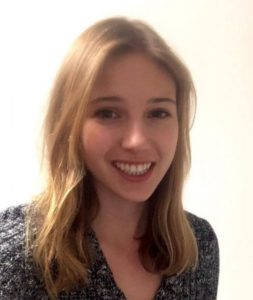LADI Interview Series #3: Get to Know Instructor Katie Carithers
 Katie Carithers is a former policy debater with experience in high school and college debate. She debated for four years at The Westminster Schools, qualifying for the TOC as a junior and senior. She has judged first and second year debates at UGA, Woodward Novice Nationals, and the 2016 Emory camp tournament, and is now a freshman at Dartmouth College, where she debated first quarter. Katie will be working at the San Jose Debate Intensive next summer. Read her interview in this third installment of LADI’s interview series!
Katie Carithers is a former policy debater with experience in high school and college debate. She debated for four years at The Westminster Schools, qualifying for the TOC as a junior and senior. She has judged first and second year debates at UGA, Woodward Novice Nationals, and the 2016 Emory camp tournament, and is now a freshman at Dartmouth College, where she debated first quarter. Katie will be working at the San Jose Debate Intensive next summer. Read her interview in this third installment of LADI’s interview series!
1. AS A DEBATER, WHAT WERE YOUR FAVORITE AFF AND NEG ARGUMENTS? WHAT DID YOU LIKE ABOUT THEM?
On the neg, I loved impact turning one advantage and then counterplanning out of the others. It put the aff in a little bit of bind because, if you included good case defense in the neg block, that strategy had two possible 2NRs to go for. Also, impact turns are fun when you’ve prepped them out. My senior year, we read a Courts aff which was really interesting and staked out a part of the topic where the actor specific disads weren’t as great on the neg and we had solvency deficits to actor counterplans. An in-depth understanding of how Courts functioned and precedents/current docket gave an in round advantage.
2. TELL US YOUR FAVORITE DEBATE “WAR STORY”. WHAT WAS DIFFICULT OR INTERESTING ABOUT THIS ROUND?
In the quarters of a tournament my senior year we were debating a new critical aff and we didn’t like our strategies. Just before speaking, my computer crashed and I lost my speech. The 2NR had almost no prep left and I had to wing it. I had been going for the Politics DA since my sophomore year and had no choice but to go for it on the spot with almost no link. It felt great to win a round on some spin that was a result of two and a half years of practice and knowing something inside and out.
3. WHAT ADVICE WOULD YOU GIVE TO YOUNG DEBATERS TRYING TO IMPROVE?
Assess where you are as a debater, both your strengths and your weaknesses. The more honest you are, the easier it will be to address the areas that will lead to the most improvement. Especially for young debaters, “process over product.” One of my lab leaders would always say, “Debate is a marathon, not a sprint.” It’s critical for young debaters to focus on the process and take the time to learn how to research and invest time in practice debates and rebuttal redos in order to be both successful and happy for the long haul.
4. COMING FROM POLICY, A LOT OF PEOPLE MAY NOT BE FAMILIAR WITH HOW YOU DEBATED. WHAT WOULD YOU CONSIDER YOUR AREA OF EXPERTISE? WHAT ARE YOU EXCITED TO WORK WITH STUDENTS ON AT SJDI?
I’m very comfortable with disadvantages, impact turns, counterplans, topicality, and theory. I didn’t read many critical arguments in high school until my senior year, but we debated them often. I’m really excited about Lincoln Douglas debate and showing the nuances of strategy planning from a policy perspective that will enhance their rounds. I’m excited to discuss research strategies with a changing topic.
5. WHAT IS YOUR COACHING PHILOSOPHY YOU BRING TO SJDI? HOW DID YOUR TIME IN DEBATE INFLUENCE THIS PHILOSOPHY?
The most important thing I learned when debating, is that given all the time and effort that you put into it, you should love it. There’s no doubt it is more fun to win, but enjoying the game either way is critical for the long haul. My senior year, after losing some tough rounds, my coach emailed us a quote that his coach had said to him and it really resonates with me and my coaching philosophy: “The ludicrous thing about this activity is that 50% of the teams lose every single time there is a debate. But, 90% of the teams expect to be winners. So, it is either about more than the winning or we are just delusional.” As a lab leader, of course I want to coach debaters to win debates. However, even the best debaters reach plateaus and lose frustrating or close rounds. Therefore, understanding and loving debate in and of itself is necessary to approach these frustrations constructively.
6. FUN QUESTION: IF YOU HAD TO CHOOSE A FICTIONAL CHARACTER TO BE YOUR POLICY PARTNER, WHO WOULD IT BE AND WHY?
Fred or George Weasley would make an excellent policy partner. They’re clearly intelligent and can think on their feet when in trouble. They were constantly practicing (making jokes/spells) and they weren’t afraid to take risks and lose (putting their names in the Goblet of Fire). They were team players (they gave Harry the Marauder’s Map). Finally, no matter how serious the situation, they could always lighten the mood.
